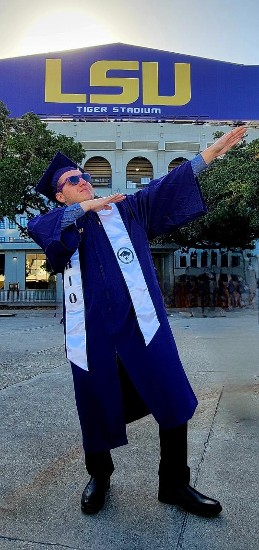
But Dallas’s mother, Tracy Matamoros, relied on her gut feeling as a mom when she was determining the next steps for her son.
“They told us that we could take him to a nursing home or to our home, but our family did a lot of research and found TIRR Memorial Hermann,” said Tracy.
Dallas arrived at TIRR Memorial Hermann in June 2020 as a patient in the Disorders of Consciousness (DOC) program. It was during the height of the COVID-19 pandemic: Tracy and her husband were able to help get Dallas set up in his room at TIRR Memorial Hermann, but could not remain with him due to visitor restrictions in place to help slow the spread of the virus.
“It was hard because I couldn’t be his in-person advocate,” said Tracy. “He was minimally conscious, and could not speak for himself. I put my faith in the team at TIRR Memorial Hermann, and they did not disappoint.”
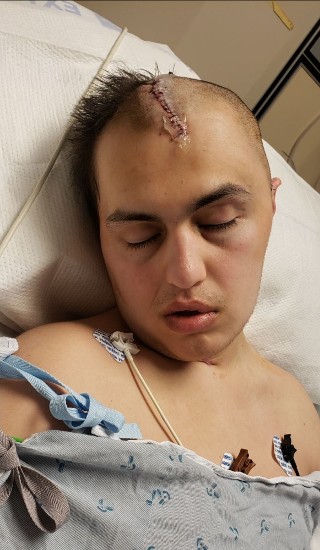
“When Dallas first arrived at TIRR Memorial Hermann, we did not know whether he was even conscious,” said Dr. Sunil Kothari, an assistant professor at Baylor College of Medicine who was the medical director of the DOC program. “But he did squeeze my hand when I asked him, even when his eyes were closed, so I knew he understood what we were asking him to do and could at least control his hand. That indicated that he had a lot of potential. One challenge was that COVID-19 didn’t allow his family to be with him as an inpatient, and we know that family presence makes a huge difference—patients tend to show us more when surrounded by their family. But his family was wonderful and kept in constant touch with Dallas via Zoom or FaceTime; I have no doubt this made a huge difference in Dallas’s recovery.”
About one-third of the way through his stay at TIRR Memorial Hermann, his care team made another discovery—they learned that the injury had also left Dallas blind.
“As Dallas improved cognitively, he would tell us that he saw something, or he would reach for something, but he would be off or there would be nothing there,” said Dr. Kothari.
TIRR Memorial Hermann clinical neuropsychologist Katherine A. O’Brien, PhD, helped Dallas adjust to his vision loss.
“As we slowly identified his visual changes, he would report being able to see but then answer incorrectly when given visual questions,” said Dr. O’Brien. “Dallas would tell me he got it wrong because the room was too dark or the writing was too small. The vision loss was something we suspected based on behavior, but he believed he could see. This type of brain injury, denial of vision loss, is called Anton-Babinski syndrome. One day I asked him about watching the TV in his room and he told me he could see it just fine, then he paused and said, ‘Well, I can’t see anything now.’ That was one of the first times he acknowledged the change in his vision.”
At TIRR Memorial Hermann, Dallas had daily physical, speech and occupational therapy. The team sometimes had to get creative due to his loss of vision and also used his interests, like football, when treating him.
“When Dallas first came to TIRR Memorial Hermann he had severe limitations, was dependent for all mobility and needed help just to hold his head up or keep his eyes open,” said his inpatient physical therapist Lisa Osborn, PT, DPT, COMT. “As therapists we try to use a patient's interests to get them more engaged and wanting to participate. I remember one of the first times he started to move one of his arms was when I was having him try to hold a football without dropping it. He still needed help, but he was activating muscles he had not been able to before.”
Osborn ensured that Dallas’s family was kept abreast of his activities and progress by sending the family videos and meeting with them on Zoom or FaceTime.
Dallas’s speech language pathologist, Chynah Blankenship, MA, CCC-SLP, CBIS, also kept his family informed through videos and other communications since they were unable to be by his side.
“When I met Dallas, he was nonverbal and demonstrated difficulty following single-step commands,” said Blankenship. “Through his time at TIRR Memorial Hermann, Dallas demonstrated significant and wonderful progress. We were able to remove his breathing tube and he progressed to a regular solids and thin liquids diet. He also began using gestures to communicate, later improving to verbal communication and working on cognitive tasks such as mathematical reasoning, problem solving and divergent thinking tasks. Because of the vision impairment, I was unable to implement and utilize typical aids like calendars and pen/paper tasks to improve his cognition, specifically his memory and awareness deficits. I had to become creative and work with him on using other methods, such as high repetition and tapping into his other senses, like touch and hearing, to improve his cognition and aid his recovery.”
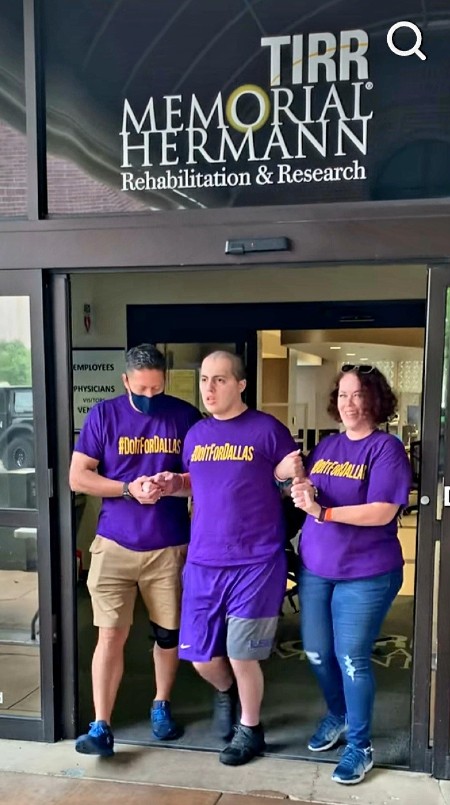
“Dallas is a very hard worker, which is evidenced by the fact that he came in needing 100% help and left walking with a rolling walker,” said Osborn.
Before returning home to Louisiana, he spent a month in a post-acute neurorehabilitation center. Once he was home, he had outpatient therapy until February 2021. At that point he was ready to learn how to return to his previous activities.
“I attended a program called Affiliated Blind of Louisiana where I learned how to function independently,” said Dallas. “It was an eight-month program where I learned to do things to take care of my home, such as cleaning and cooking.”
Tracy created a TikTok account for Dallas, called Dallas the Blind Chef, where she shared videos of Dallas cooking in their kitchen.
In August 2022, Dallas returned to LSU, and he graduated with a degree in sociology in December 2023.
“Dallas lived independently while he was at LSU,” said Tracy. “One of his classes during his senior year was a medical sociology class where he examined the quality of brain injury rehabilitation and how it relates to patient outcomes. We know about this firsthand—because we know that the quality care he received at TIRR Memorial Hermann was amazing.”
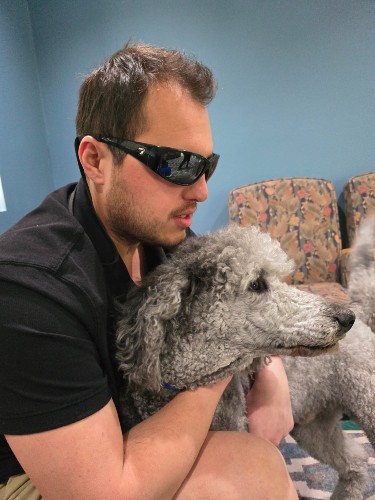
“Reed is a great companion and has really changed all of my family’s life,” said Dallas. “My next goal is to begin a professional career—and I am looking forward to one day getting married and eventually starting a family.”
“TIRR Memorial Hermann gave Dallas his life back,” said Tracy. “I don’t know if we would have had this outcome anyplace else. We owe everything to TIRR Memorial Hermann.”
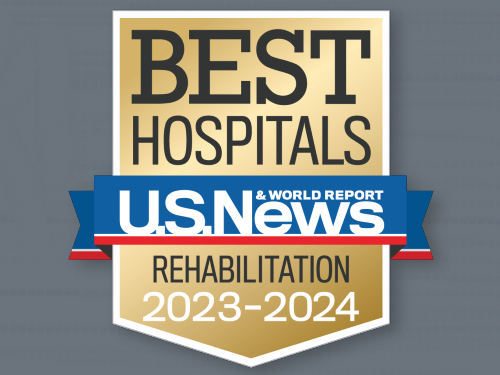
Nationally Ranked Rehabilitation
For the 34th consecutive year, TIRR Memorial Hermann is recognized as the best rehabilitation hospital in Texas and No. 4 in the nation according to U.S. News and World Report's "Best Rehabilitation Hospitals" in America.
Learn MoreContact Us
If you have questions or are looking for more information, please complete the form below and we will contact you.